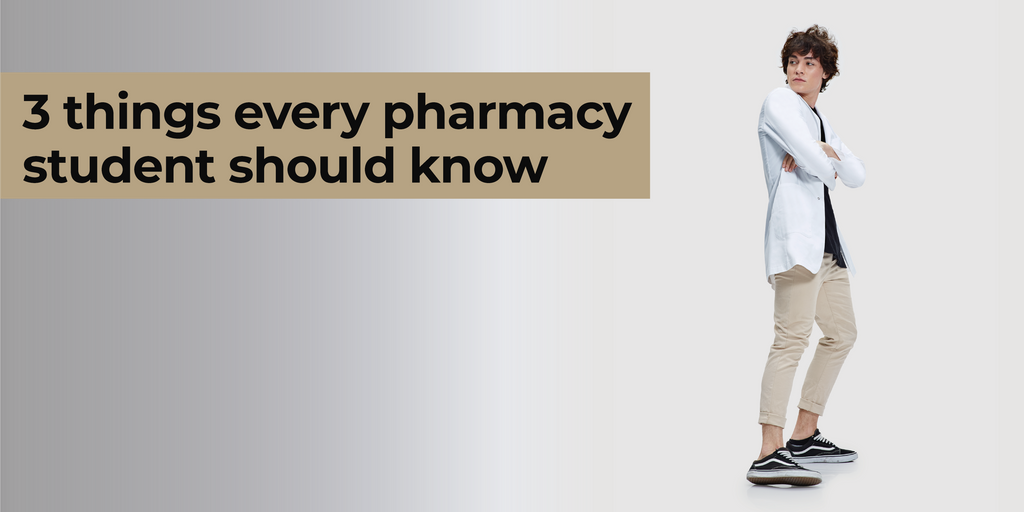
3 things every pharmacy student should know
Maybe you feel like your time in undergrad has prepared you. Everything is under control. Starting a pharmaceutical program? You’ve got this.
However certain you are, pharmacists looking back on their pharmaceutical studies overwhelming admit that there were lots of dynamics in their programs they weren’t prepared for. Knowing what to expect from pharmacy school can play a major role in how you do, all the way from applying for pharm programs to internships and graduation.
Here are a few of those hindsights that professional pharmacists want you to know ahead of time:
1: Studying changes
Any undergrad program in medicine or science will be demanding, specifically when it comes to studying. Sure, the shift from high school to undergrad probably wasn’t easy, but now you’ve got your technique down and are ready to keep pushing forward.
Luckily, the transition from high school to undergrad is generally rougher than the shift from undergrad to pharmacy school, but this does not mean there is no difference.
For one, the amount of information you’ll need to take in and handle now is going to increase drastically. Even if you’ve been comfortable jotting notes down by hand these last few years, but it’s likely that you’ll need to start typing everything up (notes, study guides, you name it) if you want to stay on track when your pharmacy program starts.
Another studying requirement that’s about to change is that you’ll need to be familiar with content at a higher level than before. Generally speaking, exams during undergrad are much more fact based and rely mostly on memorizing names, numbers and properties. Exams during pharmacy school, however, are more focused on applying the knowledge—that is, given this situation, how do you proceed?
Of course, all of those facts and properties you memorized are still important. In fact, they’re necessary for answering the questions in your graduate program. You’re really going to need to understand them well in order to use them to craft and appropriate response instead of just recalling information to fill in a blank.

In essence, you’ll need to study more, and you’ll need to study better.
2: Experience
You might have heard that getting good grades (and specifically good chemistry and organic chemistry grades) is the single most important part of getting into pharmacy school. It is very important, but there are other things you also need on your resume. Experience, for instance, is one of the most valuable things you can have in your tool belt, both to get into pharmacy school and to survive it.
Spending a few years in a pharmacist lab coat before taking on pharmacy school can work wonders. Here are a few ways how:
- For one, pharmacy schools take this sort of real-world experience into account (and not lightly).
- For another, the knowledge you gain from spending some real time in lab wear is going to help drastically in school. There’s a big difference in learning about all of the drugs that need to be prescribed and learning about the same drugs from a textbook, because you’ll be tested on them later on a patient-by-patient basis.
So yes, you need a much more in depth understanding of everything you’ve learned to-date. While working in a pharmacy is not a necessary prerequisite to getting into pharmacy school, getting in and already knowing the drugs you need to know by brand and generic name (not to mention how they all interact with one another) puts you way ahead of the curve.

For a lot of the same reasons, getting this experience during pharmacy school can also be really helpful. Getting to know how to work the information you pick up at school “in action” plus more exposure to the real lifestyle of a pharmacist can give you a much more well-rounded perspective to the information you get at school. This experience will also give you a greater appreciation for the craft and for all of the work you’ve done up to this point.
3: Competition
There’s a stereotype that a lot of challenging schools and programs are characterized by a certain cut-throat or competitive environment where every student is pushing to be better than the rest. Fortunately, this isn’t exactly true of pharmaceutical programs.
Sure, there will be competition, and getting the best grade in the class is an admirable achievement, but few pharmacists felt like their pharm programs were hostile communities. In fact, they say the opposite: you’ll bond with your classmates over all of the intense studying and academic suffering. Pharmacy school, and challenging programs in general, are more likely to feel like a team effort than an everyone-to-themselves.
There will still be an unavoidable intimidation factor. Part of being in a challenging program is the recognition that everyone there deserves to be there. Your peers are likely to have impressive resumes, and sometimes it might feel like you don’t belong. But again, everyone there deserves to be there—including you. Talking about this feeling with your classmates will likely lead you to find that a lot of your classmates feel the same way, even if you felt like they were on top of everything.

Read more about this phenomenon (called “the imposter syndrome”) in our recent article.
There are many aspects of pharmacy school that will be easier than what you had in mind. There are also aspects that will be more difficult. But you’re here for a reason, and your experience as a whole can be incredibly rewarding. In the long run, not only will your efforts go toward your own satisfaction and experience, it will impact the lives of others in big ways. Here, pharmacy school graduate Bernice Pezuzu talks about the things she wished we knew before starting pharmacy school. Take a look at her video and you’ll see these tips and more.